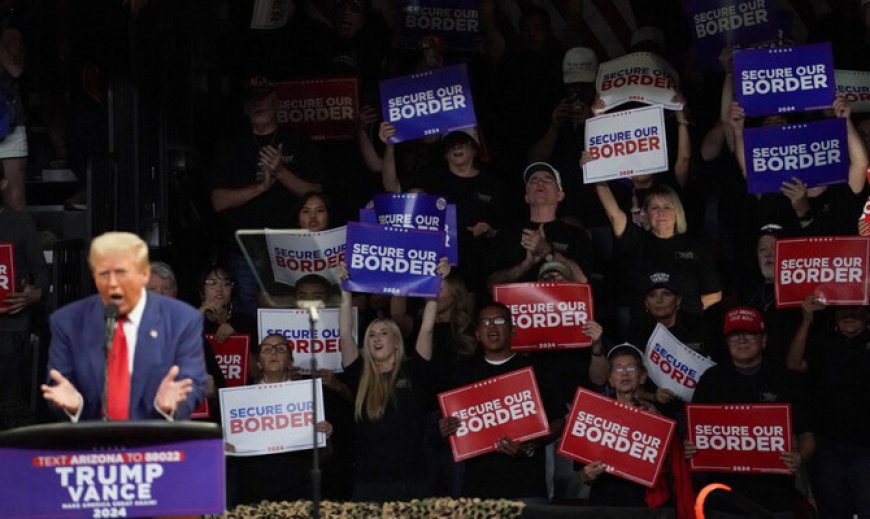Trump Pledges to Strengthen Border Security with 10,000 Additional Agents, Increases Rhetoric Against Harris on Immigration

Immigration has once more taken the stage as the 2024 U.S. presidential contest gets hot. Former president and Republican contender Donald Trump promised to recruit 10,000 more Border Patrol agents should he be able to retake the White House in November during a campaign rally in Arizona. Along with strong attacks on Democratic Vice President Kamala Harris, the current Democratic presidential contender, whom Trump blames for what he calls a terrible immigration policy under the Biden administration, the announcement accompanied scathing remarks on
Under his plan to increase border security, Trump asks Congress to provide a 10% wage raise for Border Patrol agents in addition to a $10,000 retention and signing bonus. Given the rise in illegal immigration under the Biden-Harris presidency, his campaign aims to solve what Republicans regard as ongoing understaffing of border enforcement. Given the roughly 20,000 Border Patrol personnel working now, Trump's proposal would greatly raise their ranks.
Leaders from the Border Patrol union, who have officially supported Trump's candidacy, surrounded him at the Arizona gathering, a vital swing state. Emphasizing the need of keeping seasoned personnel and hiring new agents, he said these steps are crucial for managing the U.S.-Mexico border. "This will guarantee that we can hire and retain the Border Patrol agents that we need," Trump said to a gathering of supporters.
Voters have always regarded illegal immigration as their main worry, and opinion surveys indicate that most of them believe Trump is the candidate most qualified to handle the problem. Still, his immigration record is dubious. Earlier this year, Trump was instrumental in preventing a bipartisan border security measure meant to support 1,500 more customs and border patrol agents as well as 1,600 asylum officials. Though Trump and his supporters in Congress rejected the measure, characterizing it as insufficiently strong, the package was seen as a modest attempt to improve border security while handling the humanitarian issues at the border.
Particularly given the U.S. has seen a record 7 million migrants arrested for unlawful border crossing since Biden took office, the Biden government has come under heavy fire for its handling of immigration. Republicans have attacked Biden and Harris especially for what they characterize as a "broken" immigration system that promotes illegal crossings and compromises national security. Harris has then supported the government's tactics, explaining her ideas to overhaul the immigration system by tightening asylum limitations and combating the fentanyl smuggling, a lethal narcotic that has aggravated the U.S. drug issue.
Harris has also charged Trump with using immigration for political advantage and attacked his involvement in destroying the bipartisan border security measure earlier this year. She has called Trump's approach divisive and fear-mongering, contending that his tough immigration policies are meant to inspire dread rather than provide workable answers. In a recent address, Harris said: "Donald Trump fans the flames of fear and division, instead of uniting us to fix our broken immigration system."
Trump's speech as well as his policies clearly show his more hostile attitude on immigration. He has toughened his anti-immigrant rhetoric in recent weeks, calling illegal immigrants who engage in violent crimes "monsters," "vile animals," and "stone-cold killer." Critics say his demand for the death sentence for any illegal immigrant who kills a U.S. citizen is both excessive and unconstitutional.
Although a lot of Trump's supporters find his strong immigration posture appealing, studies repeatedly indicate that immigrants—including illegal ones—are not more likely than native-born Americans to engage in crime. But Trump's rhetoric appeals to long-standing immigration-related anxieties, frequently supporting racial stereotypes and inflating anti-immigrant feelings. Critics, including Harris, contend that Trump's comments and policies have negative consequences for the treatment and view of immigrants in the United States.
Both candidates are intensifying their rhetoric since the November 2024 election is rapidly here. Seen by his fans as a fervent proponent of border security, Trump keeps marketing himself as the only candidate able to turn the flow of illegal immigration. Harris, meantime, presents herself as the voice of a more pragmatic and compassionate approach to immigration change. Immigration is still a very divisive topic, hence the result of the election can depend on which candidate people believe would help them to negotiate this important obstacle.













































